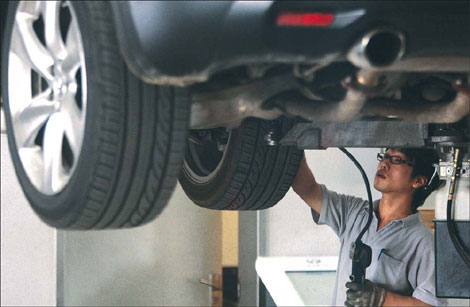Wrangle over auto warranty regulation
Updated: 2011-10-31 11:35
By Xu Xiao (China Daily)
|
|||||||||||
|
The draft law has stringent guidelines permitting return or replacement of faulty, newly purchased cars. Both carmakers and consumer representatives said a third-party agency should mediate compliance. [Photo/China Daily] |
Auto industry, consumer advocates at public hearing on draft version of new law
BEIJING - The final version of an auto warranty regulation could require that an independent third-party agency will decide disputes between consumers and car dealers.
A mechanism for warranty dispute resolution was the most-discussed topic at the first public hearing on a draft of the new law, which was first released in September.
Some 16 representatives participated the Oct 26 hearing - eight for consumers and the rest from carmakers including Beijing Hyundai, Toyota, Great Wall and Dongfeng, as well as auto repair companies and dealerships.
Following the hearing, the General Administration of Quality Supervision, Inspection and Quarantine said it will "take time to revise the draft" after considering suggestions and will release a final law "as soon as possible."
The watchdog is also continuing research and evaluating related standards, said Liu Zhaobin, director of the administration's law and regulation department.
Authority needed
Representatives of both consumers and auto companies said a third-party dispute resolution agency would be needed.
"An authoritative third-party agency should be established so dealerships cannot refuse to carry out their responsibilities," said one consumer advocate.
Customer representative Wang Jian was quoted in local media saying the qualified agency should be approved and announced publicly.
Long Wujun from Beijing Hyundai also supported the third-party proposal, noting it would save time and energy for both customers and dealers.
The draft regulation contains stringent guidelines that would require carmakers to offer warranties of least two years or 40,000 km for vehicles, and three years or 60,000 km on vehicle powertrain and steering systems.
But the most contentitious clause would permit customers to return a vehicle free of charge if serious safety problems due to quality defects arise within 30 days of purchase.
In addition, customers can return vehicles that are not safe or seriously flawed if two repairs fail to solve the problem, according to the draft.
An automotive website survey showed that 47 percent of respondents support the regulation, while 29 percent voiced a negative perception. The rest had no clear view.
Another auto survey found that almost 12 percent of respondents were concerned about how compliance will be fairly evaluated.
Dealerships voiced worries over monetary losses if a large number of customers ask to return or exchange cars.
Before the public hearing began, Dong Yang, chief of the China Association of Automobile Manufacturers, said it is not the right time to implement the regulation.
If the law is put in force too quickly, consumer rights may not be properly protected, he said.
Statistics from the China Consumer Association showed that there were 4,069 formal auto complaints in the third quarter of this year, up 14.7 percent from the same period in 2010.
Related Stories
NetEase holds auto media summit 2011-10-17 16:21
Sept auto sales up 19% month-on-month 2011-10-13 17:36
China's auto industry needs innovation 2011-10-12 15:28
Nanjing auto show promotes new energy 2011-09-30 15:31
- Restructure 'urgent' as population benefit ebbs
- Top financial officials changed in major reshuffle
- Small businesses seek less room to maneuver
- FAW reports $7.88m net loss in Q3
- Wrangle over auto warranty regulation
- Beijing's free Wi-Fi will be safe
- It's quality not quantity for Dell
- China train makers' profits slump











